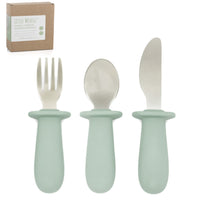

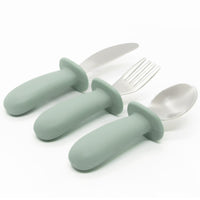
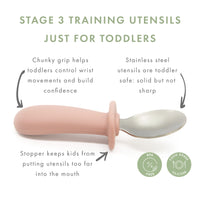
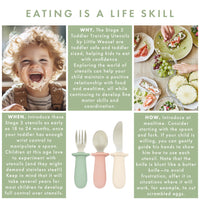
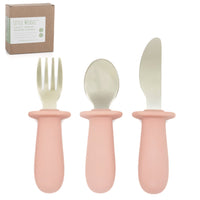
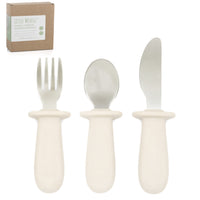
Stage 3: Toddler Training Utensils
It happens so fast: baba is now a toddler interested in feeding himself and maybe even insisting on metal utensils. Our Stage 3 Toddler Training Utensils help your little one learn, build confidence, and stay safe while working out how to use a metal fork, spoon, and knife.
Features include:
- Utensils are sized for little hands. They are short and stout with a wide grip, so they're easier for your child to control, helping to build confidence and reduce frustration at mealtime
- Utensils are made for safety. The knife and fork tines are solid but not sharp, so your little one can explore freely. Metal tines are much more effective at spearing food than silicone forks, allowing your child more control and freedom at mealtime
- Stopper design prevents your child from putting the utensil too far into the mouth, reducing choking risk
- Spoons are made of BPA free, food grade silicone combined with stainless steel
- Easy to clean and can be washed in the top shelf of a dishwasher
- Dimensions: Each utensil is about 10cm in height. Stopper measures 3.5cm
- Appropriate whether you're graduating from baby led weaning or spoon feeding.
Exploring the world of utensils can help your child maintain a positive relationship with food and mealtime, all while continuing to develop fine motor skills and coordination. Introducing cutlery is a learning opportunity consistent with many early childhood development methods, including Montessori.
Stage 3 Utensils can generally be introduced starting at about 18 to 24 months old, once your toddler is showing stronger motor skills and has the wrist control to manipulate a baby spoon. Children around this age may be eating some tougher foods that are better suited to a fork, and are typically not "mouthing" or biting into everything as much. Very often, children around this age will begin to insist on using metal utensils (knife included!), and will be delighted with this kiddie-sized set. However, every child develops on his or her own timeline. Always follow your paediatrician’s guidance regarding the appropriate age and method for introducing self feeding and utensils.
Introduce the utensils at mealtime. Consider starting with the spoon and fork. If your child is willing, you can gently guide his hands to show him how to use each utensil. Note that the knife is blunt like a butter knife—to avoid frustration, offer it in situations where it will work, for example, to cut scrambled eggs.
It will likely take some time for your little one to master these new utensils, with a lot of switching and hand feeding along the way. Around 2 to 3 years old, children begin to develop the coordination to use a knife and fork together. Children will gradually learn more complex knife skills, such as learning to spread and cut, throughout the playschool years.
As with all silicone dining products, utensils can develop a soapy taste if oil residue is retained on the surface. This is typically the result of dish washing products. Avoid dish soaps made with moisturizers or essential oils. To remove residual oils, rub with lemon or soak in vinegar.
We are pleased to offer free shipping for orders over ZAR 450. For orders under R450, we charge a flat shipping fee of ZAR 70 throughout South Africa provided that our courier is able to deliver to your address. Our shipping policy is available here.







